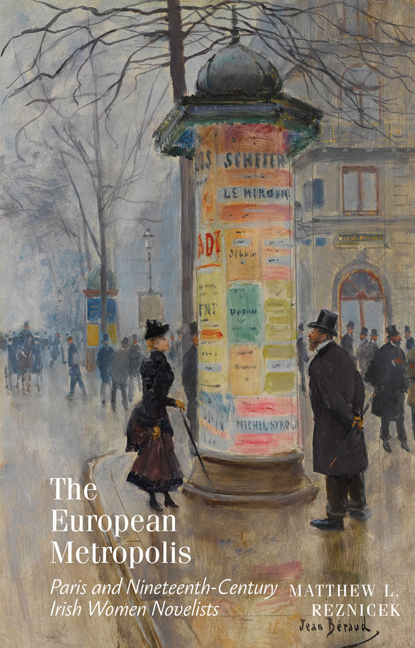Book contents
- Frontmatter
- Contents
- Acknowledgments
- Dedication
- Parvenir: An Introduction
- The Novice in the City: Sydney Owenson and the Bildung of Metropolitan Economics
- Much More than Only Le Bel Irlandois: Metropolitan Socioeconomics and Parisian Bildung in Maria Edgeworth's Ormond
- The New Jerusalem and the Rue Vavin: Urban Space, Economic Exchange, and Gendered Modernity in French Leave
- First Life-and then Fame: Gendered Fin-de-Siècle Cityscapes in Max
- A City She Must Postpone: A Conclusion
- Notes
- Works Cited
- Index
Much More than Only Le Bel Irlandois: Metropolitan Socioeconomics and Parisian Bildung in Maria Edgeworth's Ormond
- Frontmatter
- Contents
- Acknowledgments
- Dedication
- Parvenir: An Introduction
- The Novice in the City: Sydney Owenson and the Bildung of Metropolitan Economics
- Much More than Only Le Bel Irlandois: Metropolitan Socioeconomics and Parisian Bildung in Maria Edgeworth's Ormond
- The New Jerusalem and the Rue Vavin: Urban Space, Economic Exchange, and Gendered Modernity in French Leave
- First Life-and then Fame: Gendered Fin-de-Siècle Cityscapes in Max
- A City She Must Postpone: A Conclusion
- Notes
- Works Cited
- Index
Summary
Paris was not then as fine a city as it now is. Ormond, in his secret soul, preferred the bay of Dublin to all he saw on the banks of the Seine.
—Maria Edgeworth, OrmondOne productive way of reading Maria Edgeworth's Irish Tales, claims Marilyn Butler, is “in some sense [as] explicitly a sequel to or re-working” of her earliest and most well-known Irish Tale, Castle Rackrent (1800). When considered as a response to the first of her Irish Tales, Ennui (1809), The Absentee, and Ormond all share at least one notable trait: they shift the focus of the narrative away from “the quaint, archaic” and Irish narrator, Thady M'Quirk, and instead privilege the person and position of the landlords who “had in reality a more significant part to play in Irish life.” With this shift in narratological emphasis, Edgeworth's later Irish Tales can be seen as participating in the sociocultural project of the classical or, as Franco Moretti describes it, the Goethean Bildungsroman. The primary aim of this formulation of the Bildungsroman is a socialization-formation process in which “the certainty of meaning lies here not in conflict, but in a participation in the Whole,” in which the individual achieves meaningful selfhood only by taking up his socially ordained and socially required position.3 Whether we consider the former Lord Glenthorn, Lord Colambre, or Harry Ormond, each of these characters’ narratives close with his having achieved a successful Bildung.
This is in no small part because each of them has accepted the necessity of participation “in the Whole” and rejected the self-centered alternative socioeconomic systems that they have encountered, which is consistently related to the modern metropolitan landscape of London and, especially, Paris. The tension between a self-centered socialization-formation and a responsible participation in the progressive and reformist mold, which Richard Lovell Edgeworth had fostered in his daughter, carries with it an economic and allegorical component that has been absent from criticism of Ormond. While Claire Connolly recognizes Ormond as “unusual in shaping such a distinct set of relations between Ireland and France,” this focus highlights the degree to which France should be an object of study in Edgeworth criticism.
- Type
- Chapter
- Information
- The European MetropolisParis and Nineteenth-Century Irish Women Novelists, pp. 63 - 102Publisher: Liverpool University PressPrint publication year: 2017



